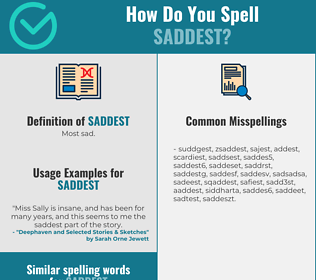Saddest is the superlative form of the adjective "sad," which commonly refers to a feeling of sorrow, unhappiness, or distress. It represents the highest degree or intensity of sadness among a range of experiences. The word is used to describe something or someone that generates or evokes the most profound emotional grief, usually resulting from unfortunate or unfortunate events, circumstances, or situations.
When something is categorized as the saddest, it is deemed to be the most heart-wrenching, tear-inducing, or emotionally devastating. The sadness associated with this term often surpasses the normal range of emotions and can leave a lasting impact on individuals.
People may describe a sad event or occurrence as the saddest when it profoundly affects them on an emotional level, leaving them feeling deeply affected or overwhelmed. It can pertain to an extreme level of loss, tragedy, or disappointment that leaves individuals with a sense of profound grief and unhappiness.
The saddest moments, songs, movies, or stories often resonate with individuals on a deeply personal or universal level, highlighting the complexities of human emotions. These experiences, which stir up feelings of profound sadness, may serve as catalysts for empathy, introspection, or understanding.
In summary, "saddest" signifies the highest level and most intense form of sadness, encapsulating the deepest emotional distress, grief, and unhappiness resulting from unfortunate circumstances.





